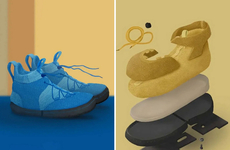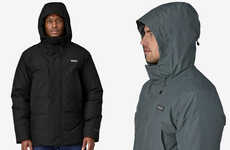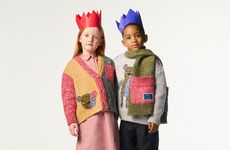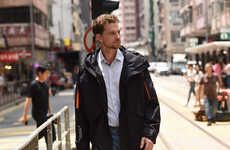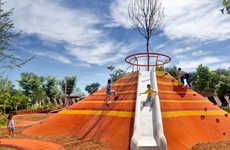
The Scout Rain Jacket Can Be Adapted Vertically and Horizontally
Ellen Smith — June 21, 2017 — Eco
References: core77 & assets.c2ccertified.org
The Scout rain jacket was designed to exceed the typical lifespan of a child's rain coat, ultimately reducing the waste that accumulates as a result of fast fashion.
Children between the ages of 6 and 12 grow at rapid rates, resulting in parents having to constantly buy new clothes to accommodate their child's new size. This factor, coupled with the fact that the apparel industry is the second highest contributor to waste led the team at Scout to create this adaptive rain coat. The design is a simple and stylish unisex raincoat that can be adjusted vertically and horizontally, growing with your child.
The simple premise behind this coat aims to amend the short life span of clothes, ultimately extending the longevity of the product, and reducing the waste involved with the production of children's apparel.
Children between the ages of 6 and 12 grow at rapid rates, resulting in parents having to constantly buy new clothes to accommodate their child's new size. This factor, coupled with the fact that the apparel industry is the second highest contributor to waste led the team at Scout to create this adaptive rain coat. The design is a simple and stylish unisex raincoat that can be adjusted vertically and horizontally, growing with your child.
The simple premise behind this coat aims to amend the short life span of clothes, ultimately extending the longevity of the product, and reducing the waste involved with the production of children's apparel.
Trend Themes
1. Adaptive Children's Apparel - Creating versatile kids' clothing that can grow with them offers sustainable alternatives to fast fashion.
2. Circular Economy in Fashion - Implementing innovative designs that extend the lifespan of garments reduces waste in the apparel industry.
3. Sustainable Parenting Products - Developing eco-friendly and durable children's items appeals to environmentally conscious parents and reduces the need for constant repurchase.
Industry Implications
1. Children's Apparel - The children's clothing industry has an opportunity to adopt adaptive designs to reduce waste and increase longevity.
2. Fashion and Textiles - Incorporating sustainable practices and circular economy models can disrupt the traditional fast fashion industry.
3. Parenting and Lifestyle - Targeting eco-friendly and sustainable parenting products appeals to a growing market of conscious consumers.
5.3
Score
Popularity
Activity
Freshness


